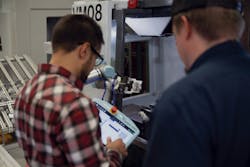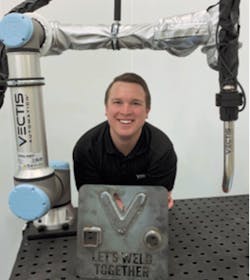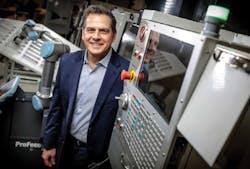Cobots and the Rise of Lean Integrators
The rise of system integration firms over the past several decades to help manufacturing companies design and commission industrial robots and other advanced automation systems has predominantly been a boon to larger manufacturers. The business model structure of these integrators evolved along with the demands of the larger manufacturing customers they served as the implementation of these technologies often required changes to a facility’s power structure, floor plan, and operational procedures. The overhead associated with these projects meant that the system integration contract was rarely less than $250,000, thereby putting these projects out of reach of most small to mid-sized enterprises (SMEs).
In response to this gap, Campbell points to the rise of a new type of system integrator—a type of organization he refers to as lean integrators. “The lean integrator evolved precisely to address the SME market’s growing demand for robot installations that yield higher productivity at a lower price point and that can be installed in a fraction of the time of a traditional robot work cell,” says Campbell. “Like the SMEs they serve, lean integrators are small enterprises themselves. The two features that distinguish lean integrators from their traditional counterparts are size and speed.”
Lean integrator business model
Describing lean integrators in more detail, Campbell notes that these firms typically focus on mastering one or two end applications within a regional market and often employ no more than 10 to 15 people, “Their operational footprints rarely exceed 10,000 square feet, and they tend to deploy capital on knowledge workers rather than equipment for vertical integration. All this translates into much lower operational overhead while spurring innovation, which enables lean integrators to be successful even when taking on projects under $100,000,” he says. “It also allows them to commission cobot installations within weeks rather than the months-long process required to integrate industrial robots.”
While, at first glance, it may appear that specializing in serving smaller enterprises would not necessarily be the most viable business model, Campbell says that lean integrators actually address a much larger overall market for their services. “Most manufacturing firms in the United States are SMEs, according to U.S. Census Bureau statistics on U.S. businesses,” says Campbell. “Of the 248,039 U.S. manufacturing firms the bureau listed in 2017, 83% employ fewer than 500 people. And nearly 70% of manufacturing firms have fewer than 20 employees.”
Based on their operations structure, lean integrators tend to favor off-the-shelf peripherals and accessories versus fabricating every tool in-house to meet a customer’s unique specification. “The make-versus-buy debate usually ends with a buy decision,” Campbell says, “keeping overhead down and the speed of execution up. This approach has facilitated the growth of partner ecosystems around cobots (collaborative robots).”
Universal Robots, for example, developed Universal Robots+, a global ecosystem of components, software, and application kits that have been validated and certified to be mechanically, electrically, and digitally compatible with cobots from Universal Robots. “This approach further drives down time, cost, and risk as compared with a traditional automation approach,” adds Campbell.
Welding operations
One of the lean integrator firms that Campbell references is Vectis Automation, founded in 2019 in Fort Collins, Co., by a small team of engineers with expertise in traditional robotic welding applications. With the average age of a U.S. welder being 55 and likely to retire within 10 years, according to research by Deloitte, this makes the services offered by Vectis Automation particularly attractive to manufacturing operations that rely on welding.
According to Josh Pawley, director of business development and Vectis Automation co-founder, Vectis can install cobots for welding applications in hours or days instead of weeks or months. “One of our customers was removing shrink-wrap from a Universal Robots’ product in the morning and had it in production on their own by the afternoon. And that was a customer who had never used robots,” says Pawley.
CNC machine tending
Another lean integrator is Fusion Cobotics, located near Chicago. This company is not a new lean integrator company, but one that started in 2002 as a traditional integration firm and transitioned into lean integration in 2018 with the use of cobots to tend the company’s CNC machines.
This led the company to begin focusing on helping small to medium-sized job shops performing high-mix, low-volume applications to automate the tending of CNC mills and lathes, as well as press brakes for sheet metal.
“Universal Robot’s ecosystem enables everything we do to be menu driven, which is what makes us lean,” Zoberis adds. “Basically, we offer four Universal Robots products—the UR3e, UR5e, UR10e, and UR16e—that we tailor to customer applications for quick deployment.”
Zoberis says Fusion’s customers typically see a 25% to 30% improvement in efficiency, which typically translates into a return on investment in 10 to 11 months.
About the Author
David Greenfield, editor in chief
Editor in Chief

Leaders relevant to this article:




